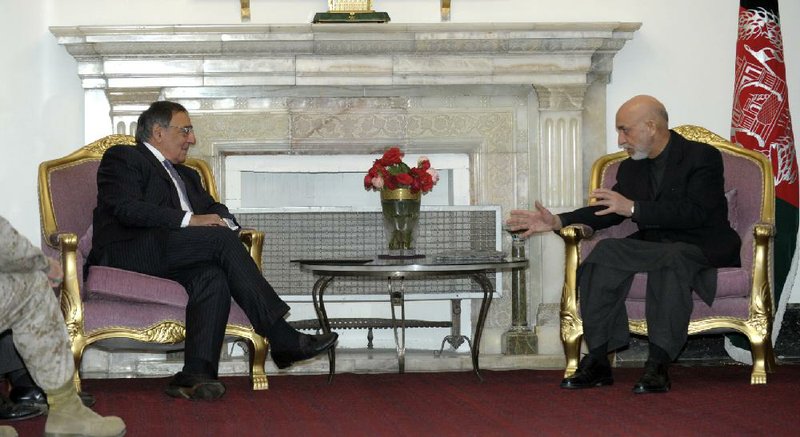LITTLE ROCK — President Hamid Karzai said Thursday that he will meet President Barack Obama in Washington next month to discuss a postwar U.S. role in his country, whose fragile security was highlighted hours earlier by a suicide bombing that killed one U.S. serviceman and two Afghan civilians.
At a news conference with visiting Defense Secretary Leon Panetta, Karzai said he and Obama will discuss how many U.S. troops will remain after the Western combat mission ends in December 2014. He said he understands that immunity from Afghan laws for those remaining Americans is of “immense importance” to Washington, but he added that he has his own priorities in negotiating a postwar U.S. role.
“Give us a good army, a good air force and a capability to project Afghan interests in the region,” Karzai said, and he would be ready to argue “with ease and with reason” that his country should grant immunity to U.S. troops.
Obama has said the U.S. will not abandon Afghanistan and risk that it might revert to the al-Qaida haven it became in the 1990s after the Taliban took power.
The Taliban are a small but resilient force, even after 11 years of fighting a vastly larger U.S.-led international force. They claimed credit Thursday for the suicide bombing that killed three and wounded 17 near an entrance to Kandahar Air Field, the largest Western base in southern Afghanistan. Panetta and his traveling party had left the airfield about two hours before the attack.
The U.S. military did not identify the American who was killed. It said an investigation was under way.
Panetta was at the airfield for about three hours, receiving a briefing from U.S. commanders. Panetta also spoke to about 350 U.S. troops and took questions from them before flying back to Kabul, where he met with Karzai at the presidential palace.
The Karzai-Obama meeting, which Panetta said would occur during the week of Jan. 7, with no specific date set, also is intended to discuss prospects for establishing a process for pursuing peace with the Taliban.
The main message of Panetta’s two-day visit to Afghanistan was one of reassurance to Afghans that they will not be abandoned after 2014. And he made a pitch for patience among Americans tired of war.
“For the first time since 9/11 we have a chance to achieve the mission that we are embarked upon,” Panetta said. “To achieve that mission will require a continued commitment, continued perseverance, continued partnership and continued sacrifice on the part of our nations.”
The Pentagon chief, who is expected to step down early in 2013 and return to private life, also made a plea for Pakistan to do more to clear al-Qaida, the Taliban and other extremist groups from havens on its side of the border with Afghanistan.
He said Pakistani leaders have often promised to take action “but have not followed through.” Without such action, peace and security in Afghanistan will remain elusive, Panetta said.
Another major issue facing Panetta in the closing weeks of his tenure is how many U.S. troops to withdraw from Afghanistan in 2013 and 2014. There currently are 66,000 in the country, down from a peak of about 100,000 in 2011.
U.S. Army Maj. Gen. Robert Abrams, commander of international forces in four southern provinces, including the key province of Kandahar, told reporters Thursday that he foresees further troop cuts in coming months, but he did not specify whether he was talking only about U.S. troops.
In other developments, a senior Pentagon official said Thursday that American and coalition forces in Afghanistan will be more vulnerable to deadly improvised explosive devices as the military draws down troops next year.
Lt. Gen. Michael Barbero described his concerns about what is the top cause of military and civilian deaths in Afghanistan and Pakistan in congressional testimony that also underscored U.S. frustration with Islamabad’s efforts to thwart the production of the devices known as IEDs, most of which are fertilizer-based explosives.
Meanwhile, the powerful chief of Afghanistan’s spy agency is being flown to the U.S. aboard a specially equipped military transport plane for treatment, nearly a week after suffering severe abdominal wounds in a suicide bombing, Afghan and coalition officials said Thursday.
Treating the wounds suffered by Asadullah Khalid was beyond the scope of the doctors and facilities available at Bagram Air Base, the coalition complex north of Kabul where Khalid was taken within hours of the attempted assassination last week, officials said.
Information for this article was contributed by Donna Cassata of The Associated Press and by Matthew Rosenberg and Habib Zahori of The New York Times.
Front Section, Pages 6 on 12/14/2012

